
Portugal has long been in the global spotlight, yet it often remains an underrated gem tucked away in the westernmost corner of continental Europe. Several factors make Portugal a highly desirable destination for relocation or second residency. Safety, an abundance of sunshine, outstanding air quality, a welcoming population, universal healthcare, and access to top international schools and universities are just a few examples.
Nevertheless, Portugal’s biggest draw may still be its cost of living—which is especially significant in 2025, when many parts of Europe are grappling with rising expenses. The country is known for being one of Western Europe’s most affordable locations, an attribute that complements its modern infrastructure and high quality of life. It is not hard to see why expats and investors alike view Portugal as a top-tier choice.
Cost of Living in Portugal vs Other Countries
The average cost of living in Portugal is considerably lower in comparison to several other Western nations, with essentials such as groceries, healthcare, childcare, and education costing less. This affordability coexists with a broad set of high-quality services—Portugal follows the broader European trend of strong public provisions, enabling citizens and residents to enjoy a high standard of living at a more modest price point.
Expatistan, an open-sourced international cost of living index, ranks Portugal in the 34th position, while the first position is occupied by Cayman Islands, followed by Switzerland as the most expensive countries on the list.
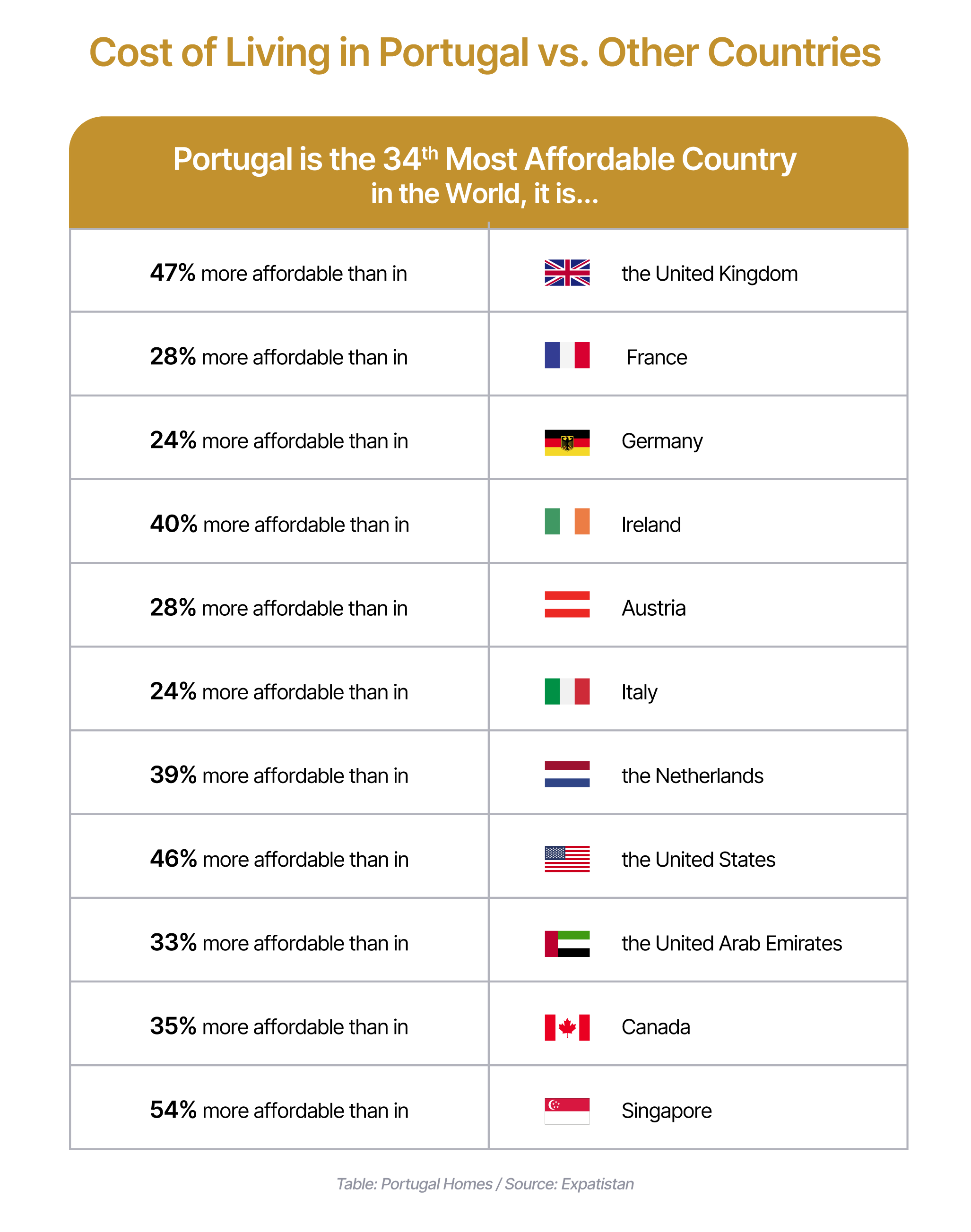
Eurostat, the EU’s official statistical agency, also places Portugal notably under the average cost levels for goods and services within the bloc. Updated estimates from December 2024 suggest that Portugal is still approximately 13% below the EU average in 2025, whereas certain EU nations top the scale, with Switzerland and Iceland costing over 50% above that average. This gap highlights Portugal’s advantageous position for both short and long-term relocation.
Portugal’s culinary scene may not enjoy the same global recognition as Italian or Japanese cuisines, yet it consistently impresses food enthusiasts. Taste Atlas rates Portuguese cuisine as the 5th best in the world, just behind Greek, Italian, Mexican, and Spanish, thanks in part to delectable seafood dishes, regional specialties, and the famed Port and Madeira wines.
Despite this culinary prestige, basic food and drink expenses remain affordable.
Groceries
In Portugal, there is a term often heard; the “cabaz alimentar essencial.” Literally translated as “essential food basket,” it is used to describe about 63 products considered fundamental for a typical and varied Portuguese diet. According to the most recent data from DecoProteste, Portugal’s consumer protection agency, released in January 2025, the average cost of the cabaz stands at approximately €240.08—reflecting a slight inflation since the previous year, but staying competitive relative to western European peers.

The 63 food products include in the cabaz: various meats, including beef, pork, and chicken; various fishes, including codfish, salmon, bream fish, sea bass, and fresh fish; frozen foods, including ultra-frozen peas, fish fingers; fruits and vegetables, including oranges, apples, bananas, tomatoes, lettuce, broccoli, carrots; dairy products, including cheeses, milk, butter, and yogurts; and other miscellaneous products, like olive oil, spaghetti, flour, cereals, salt, sugar, bread, etc.
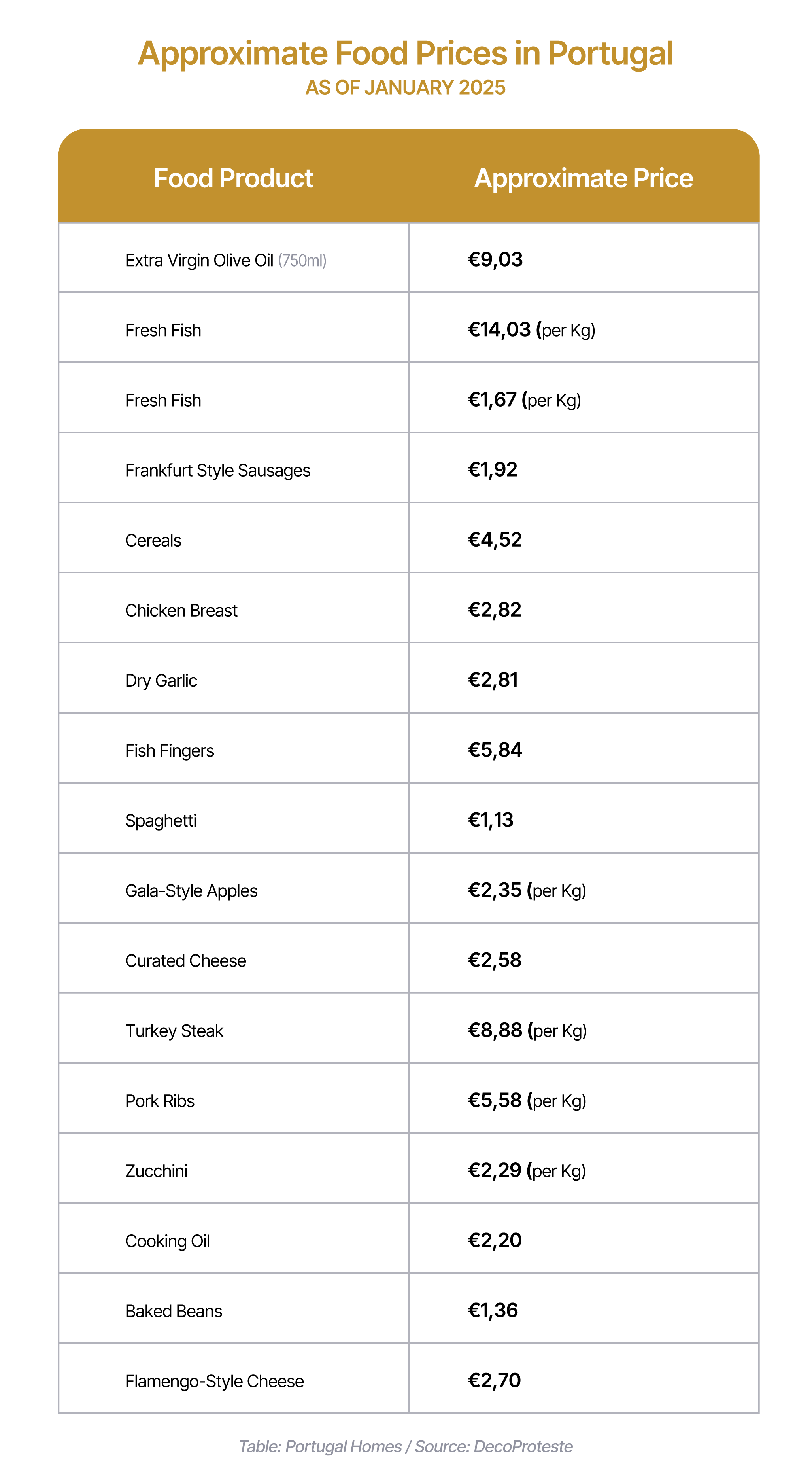
Restaurants
Dining out costs vary depending on the city and type of establishment. Lisbon remains the most expensive metropolitan area, followed by tourist-heavy regions like Porto and the Algarve. Regardless, the price of a meal in central Lisbon frequently remains below the norm of European capitals like Paris or Rome. In smaller Portuguese towns, it is still common to find a decent meal at a very reasonable price.

Taking the prices in Lisbon to paint a broader picture of the country, Portugal Homes resorts to Numbeo, another crowd-sourced global database, which gathers data on several quality-of-life indicators, including the cost of living, and Portugal Homes’ own experience. Numbeo has the particularity of selecting specific cities’ cost of living, enabling to verify costs of meals at restaurants.
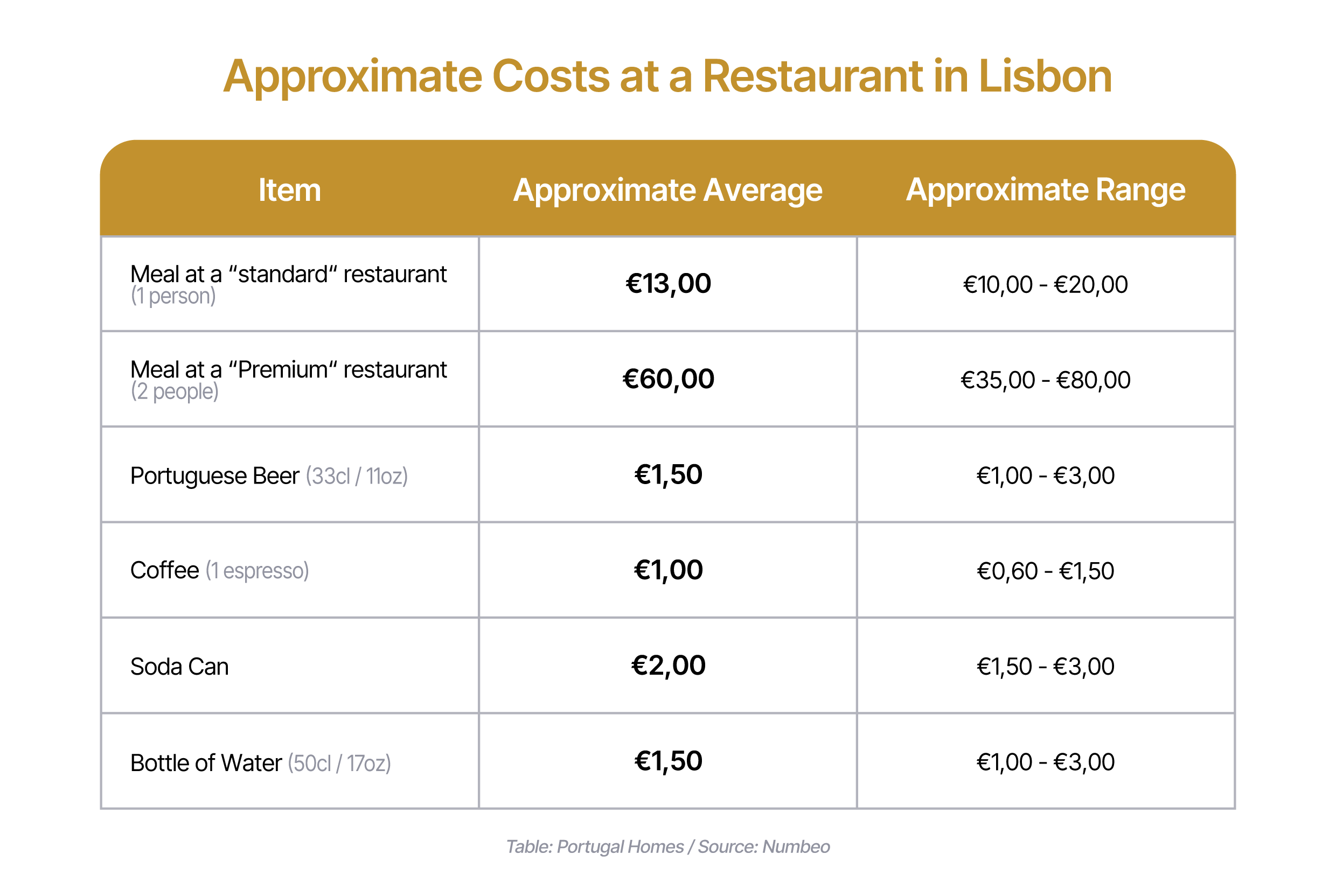
Beyond Lisbon, Porto and the Algarve, the prices can be considerably more affordable. It is not uncommon to find restaurants where a glass of house wine is around €2,00. In comparison, Portugal is decidedly cheaper than other European countries like France and Italy in terms of eating out at restaurants.
The Portuguese Real Estate Market has evolved into a central pillar of the national economy. With the Golden Visa shift that took effect in 2023—removing direct real estate investments as a qualifying path—many analysts anticipated a downturn. Yet, property prices have only continued to climb, demonstrating the remarkable resilience of Portuguese real estate.
- Rising Demand: Lisbon, Porto, and the Algarve lead the increase, reflecting high interest among both domestic and international buyers. The city of Lisbon, for instance, has even been classified in the top 10 for Real Estate investments in Europe.
- Steady Rental Growth: INE (Statistics Portugal) reported on December 23rd, 2024, that the median monthly rent per square metre stands around €8 for continental Portugal—a modest increase from the previous year. Core urban centres exceed this number, sometimes surpassing €16/m² in premium Lisbon districts.
- Property Values: INE also informs that Portugal’s average housing prices at roughly 1,736 €/m², with hot spots like Lisbon nearing or exceeding €4,367 €/m². This steady ascent hints that investing sooner rather than later may secure more favourable rates.
Foreign Buyers
International stakeholders continue to play a major role, with Lisbon seeing around 65% of purchases in certain prime areas from buyers who maintain addresses outside Portugal. This trend supports the notion that the domestic market remains robust, even after modifications to the Golden Visa.
If anything, this only reveals the Real Estate sector’s resilience and its growth is unstoppable, proving to be an excellent investment opportunity in Portugal.
Read more on Portuguese Real Estate Market:
The Portuguese Real Estate Market in 2024
Lisbon Property Prices On The Rise Despite The Golden Visa End In Real Estate
Lisbon is Among the Best for Real Estate Investments in Europe
Investing in Portugal Real Estate

Rental Costs
The Portuguese Real Estate industry’s resilience reflects on the rental costs. Broadly speaking, the more the countryside a property is located, the more affordable it is, and the closer to Lisbon, the more expensive the rental cost will be. According to the latest data provided by INE, published in December 2024, the national median price for new rentals in Portugal was €8 per square metre as of a median house rental value of new lease agreements of dwellings.
The regions of Greater Lisbon (€16,18/m2), Cascais (€15,88/m2), Oeiras (€13,98/m2 each), Funchal (€12,70/m2), and Porto (€12,57/m2), among others, were all more expensive than the national median price for new rentals
Property Prices
The prosperity the real estate sector is currently experiencing also applies to property prices. The interest in Portugal and everything the country has to offer is at an all-time high, and following the rules of supply and demand, the property prices are the highest they have ever been.
Data published by INE on October 22, 2024, shows that the median house price in Portugal rose to €1,736 per square metre. This represents a 6.6% year-on-year increase, up from 5.0% in the previous quarter. Out of Portugal’s 26 sub-regions, 21 saw house prices rise compared to the same period in 2023.
With no great surprise, Lisbon leads the charge when it comes to property prices, registering €4,367/m², Cascais marking €3,994/m², Oeiras surprising with the number of €3,360/m², and finally Porto, marking €3,031/m². The data report also reveals that property prices have been steadily growing.
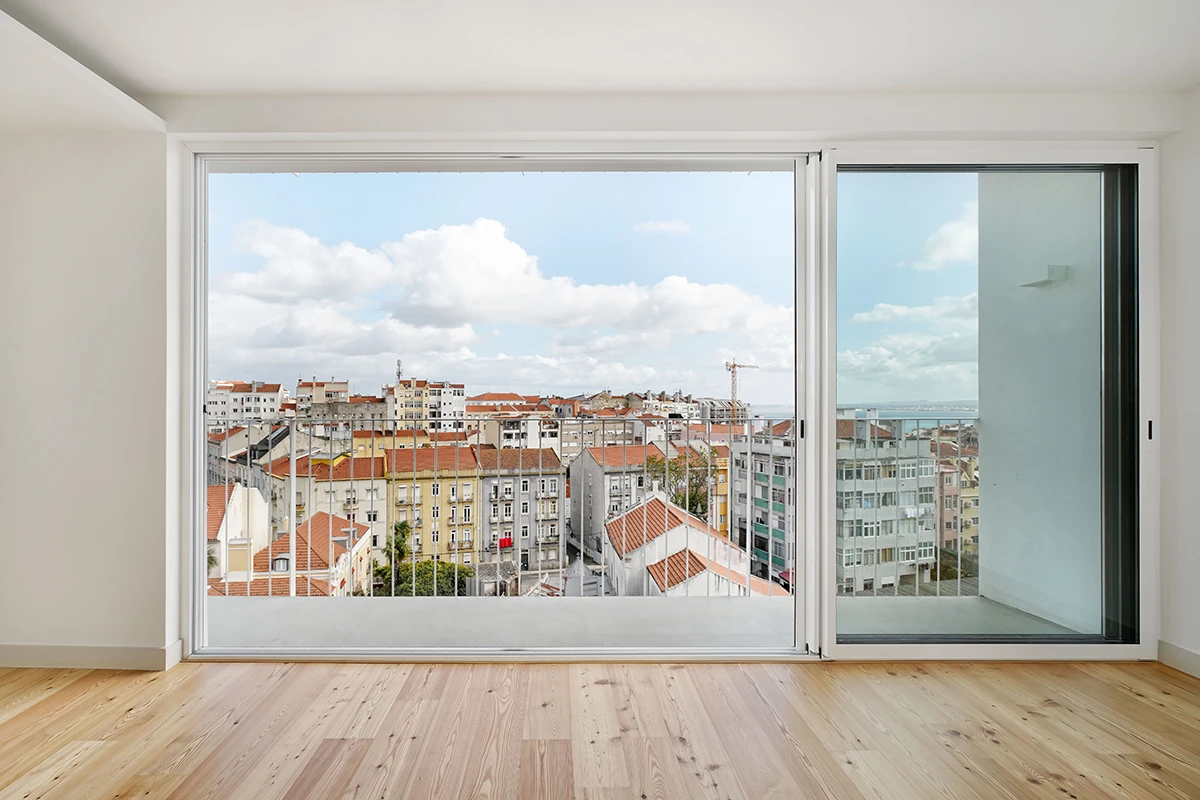
Cost of Domestic Bills
Water, Electricity, and Gas
Most water supply comes from local municipal authorities, while electricity and gas services are privatised. In 2025, an average monthly energy bill for a household of two typically ranges from €40 to €80, depending on usage, while water charges amount to roughly €15 to €30. Gas usage often depends on whether homes rely on natural gas or purely electric systems. For instance, electricity and gas services can also be acquired separately from different companies. Though properties are typically set up to receive natural gas, some people prefer to go all-electric and have water heater tanks at home and electric ovens and stoves.
Telecoms
Internet, cable TV, and phone packages in Portugal start around €30 monthly for basic deals, offered by the major providers NOS, MEO, and Vodafone. NOWO, Digi and similar alternatives also exist, providing more specialised or cheaper bundles. Telecommunication companies can also offer other packages with increased speeds and more TV channels at higher prices. Some packages include cell, mobile, streaming services or internet data for an extra fee.
It is important to keep in mind these prices are merely indicative for your reference. They may have increased or decreased since the time of the original research in January 2025. Portugal Homes does not support any company, nor do we advise on company selection. It is always best to research what best suits your needs.
Portugal’s minimum wage sits at approximately €870 as of January 2025, reflecting a slight increase from the previous year. While still modest compared to more affluent EU nations, average salaries, especially in metropolitan regions or within specialised industries, are improving.
The average wages have a more positive outlook, especially in the private sector.
Although the cost of living varies greatly around the world, it continues to rise everywhere. While Portugal remains affordable, its salaries are not particularly appealing. In fact, Eurostat, the European Union’s statistical office, places Portuguese salaries below the EU average when it comes to purchasing power parities and GDP per capita.
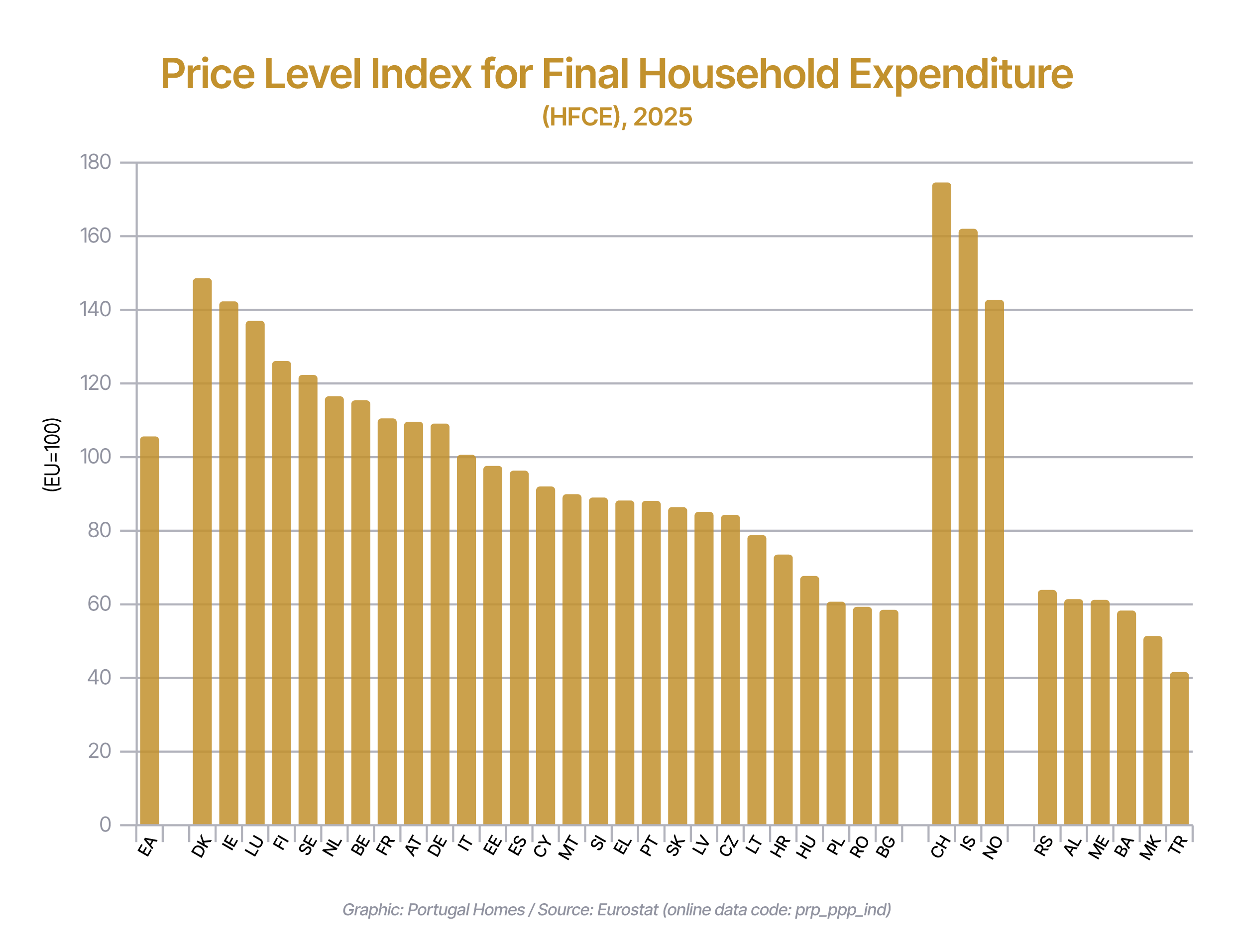
According to the latest data made available from 26 March 2024, Portugal was 10% below the EU average when it comes to purchasing power parities, meaning that Portuguese people’s purchasing power in terms of essential goods and services is admittedly low, largely in thanks to the unattractive salaries in Portugal.
Expats and investors seeking to relocate and enjoy the country’s several other benefits should keep in mind that the best option is to work remotely to a wealthier country, earn higher wages, and enjoy the Portuguese lifestyle and the lower cost of living.
Portugal has become, in recent years, many retirees’ home away from home, with expat communities found everywhere across the country, and even in more remote areas, such as the countryside. In 2024, the number of foreign residents reached a record number, which includes retirees, and if anything, this widespread phenomenon is indicative of how easy it is to relocate to Portugal and how affordable essentials like groceries, restaurants, and domestic bills are.
For retirees seeking to enjoy their golden years in one of Europe’s sunniest countries, the largest obstacle in the path will definitely be property acquisition. Although property prices have increased, many retirees still find cheaper option in Portugal than they would in the United States, United Kingdom, or other European capitals.

The process, while transparent, can be intricate, featuring legal steps that benefit greatly from expert advice. Portugal Homes offers comprehensive solutions to streamline property searches, handle legalities, and manage ongoing After Sales services like tax representation and property management.
Portugal has a universal and public healthcare system, the SNS - Serviço Nacional de Saúde (the National Healthcare Service), which is accessible to every taxpaying citizen and resident. The SNS guarantees primary care in the form of family doctors who typically practice in USFs (Unidades de Saúde Familiar, commonly referred to as Health Centres), and urgent care via hospitals.
While appointments in Health Centres are free of charge, a visit to the Emergency Room at a hospital may be charged with taxas moderadoras (moderation fees), which are the fees associated with the healthcare treatment. The fees depend on the treatment and service provided and vary from hospital to hospital. However, other than usually being quite affordable, there are multiple ways of obtaining an exemption to paying the fees, like simply calling ahead to SNS24, the 24-hour open line, to obtain a referral, effectively making healthcare in Portugal free.
The downside of SNS is the long waiting periods, either for a regular primary care appointment or an urgent care Emergency Room visit. Because of this, it is always advisable to acquire private healthcare insurance, of which the prices vary depending on each specific situation but are far more affordable when in comparison to the prices practiced in countries like the United States. On average, an individual plan costs between €30,00 to €60,00 monthly. Naturally, this amount increases when considering a broader family plan, which may rack up to €150,00 to €200,00 per month.

In Portugal, the public education system is free and compulsory between the ages of 6 and 18. Children typically enrol in a primary school’s 1st grade at 6 years of age and finish high school, in the 12th grade, at age 18. However, there are also alternative, private options spread throughout the country.
International schools in Portugal typically have diverse student bodies and offer alternative curriculum—such as the IB, British, and American programs—all of which are generally taught in English. In total, Portugal has 55 international schools throughout the country. 27 of them can be found in the Lisbon area, and a family can expect to spend, on average, between €5,000 to €15,000 in yearly tuition fees, though some schools may have higher or lower fees.

Before a child starts primary school in Portugal at age 6, parents have a few options when it comes to childcare.
- Berçários or Infantários (nurseries) will welcome newborn children, and up to the age of 3.
- Kindergarten is the next level, accepting children from the ages of 3-5, though they are not mandatory, and the children can be left in the care of a nanny or a grandparent, for example.
In the same vein as the following grades in the Education system, there are both public and private options for childcare. While public childcare services are free, it is not particularly well-funded, and waiting lists can be long. There are private institutions exclusively dedicated to providing childcare services, but some international schools offer not only compulsory grades but also pre-school nurseries and kindergarten services. In comparison, childcare is significantly more affordable. While each institution will have its own pricing, the cost to enrol a child in a nursery or kindergarten will average between €2,000 to €5,000 yearly in tuition, not accounting for extra fees.
The simple answer to this is: yes. However, public transportation systems are only truly well-developed and functioning in larger cities, like Lisbon and Porto. A car to get around becomes a must the further away from the bustling metropolitan areas you go. Smaller cities have their local transportation systems too, not connected to a larger network, but typically are unreliable and exist to mostly service the older population segments.
Public Transportation in Lisbon
However, getting around in Lisbon is effortless. The capital city, corresponding to the municipality of Lisbon, is only 1 of 18 in the greater Lisbon Metropolitan area, which is highly connected, being serviced by multiple buses, an underground metro, a railway service, trams, and boats. The Lisbon Metropolitan Area includes the following municipalities:
Lisbon, Alcochete, Almada, Amadora, Barreiro, Cascais, Loures, Mafra, Moita, Montijo, Odivelas, Oeiras, Palmela, Seixal, Sesimbra, Setúbal, Sintra, and Vila Franca de Xira.
You can purchase a Monthly Transportation Card, called Navegante Metropolitano, which enables any enroling participant to access all the previously mentioned transportation methods for €40,00 per month. Alternatively, single-purchase tickets are also available, either in the transportation itself, like the Carris buses, or in machines present at the Underground Metro and CP Railway services. For instance, in January 2025 a single ticket purchased at a machine in a Metro station costs 1,85€, though it can also be used on Carris buses.
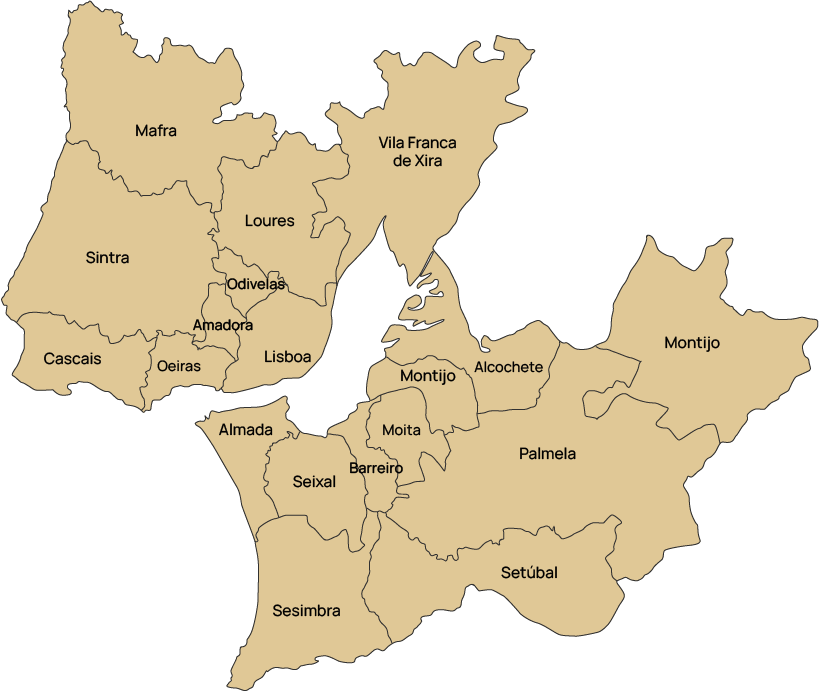
Public Transportation in Porto
The city of Porto also has its own Monthly Transportation Card called Andante Metropolitano, which covers all the transportation methods available in the larger Porto Metropolitan Area, including buses, railway services, and Underground Metro at a cost of €40,00. In Porto, the price depends on the distance of the journey rather than the transportation methods used to reach there, which means the price is the same across the board. The Porto Metropolitan Area includes the following 17 municipalities:
Porto, Arouca, Espinho, Gondomar, Maia, Matosinhos, Oliveira de Azeméis, Parede, Póvoa de Varzim, Santa Maria da Feira, Santo Tirso, São João da Madeira, Trofa, Vale de Cambra, Valongo, Vila do Conde, and Vila Nova de Gaia.
The city is divided into 6 Zones, and journeying across them means a slight price increase when making an occasional trip, which can be for a single use or 24-hour use. For instance, making a single trip within Zone 1-2 will cost €1,40, while crossing over to Zone 3 will cost €1,80, and up to Zone 9 can cost €4,55. 24-hour tickets begin at €5,15 for within Zone 1-2, and run up to €16,70 for up to Zone 9.
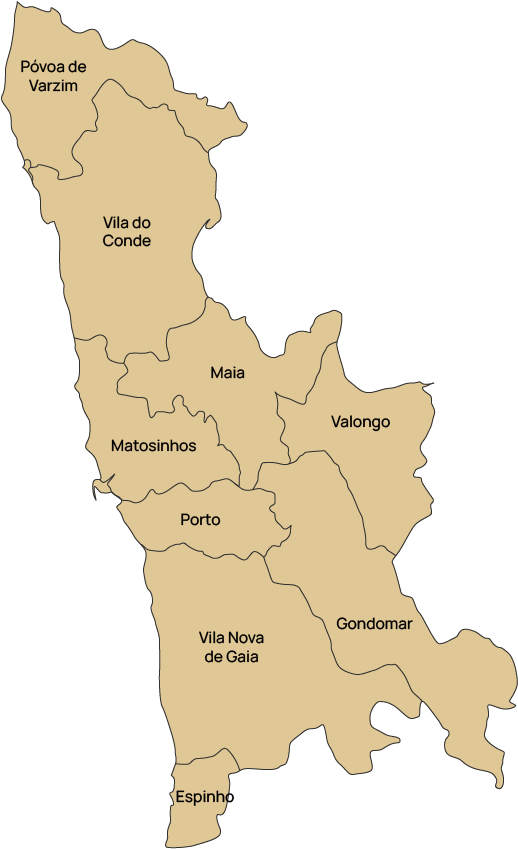
Railway Transportation across Portugal
In terms of railway services, operated by CP – Trains of Portugal, Lisbon has several stations, each strategically located at key points around the main Lisbon Municipality, which also connect to the other Municipalities surrounding Lisbon. Getting around within the Lisbon Municipality via a Suburban Railway service typically costs €1,45, but it might increase if there is a Railway Line crossover. There are also 24-hour tickets, some of which include other transportation methods. A 24-hour ticket for the Metro Underground, CP Railway, and Carris Buses costs 11€.
In October 2024 a new transport option was introduced: the Green Railway Pass. This option can be requested only by residents in Portugal, it costs €20 per month and remains valid for 30 consecutive days from the start date selected at purchase—regardless of when it was acquired. To use the pass, riders must load it onto their CP Card for the chosen validity period.
Portugal’s Low Cost of Living Attracts Investors, Expats and Digital Nomads
When it seems like there is not anything else that Portugal can give to its citizens and residents, the country continues surprising and stunning people, enticing them to stay and presenting more reasons to settle down, either temporarily or permanently. For instance, Residency in Portugal enables visa-free travel to the 29 European countries within the Schengen Zone, and currently has the fastest path to EU Citizenship, taking only 5 years to enable its holders to apply for a Portuguese passport.
Remote workers, in particular, will be content to know that Portugal has one of the best Wi-Fi services in Europe, enabling high-speed internet connection. However, expats and investors are drawn to Portugal not only because of its lower cost of living but also because of the country’s pro-investment environment and the attractive tax regime.
How is the ratio between Cost of Living and Quality of Life in Portugal?
The only downside to Portugal is the lower salaries in comparison to other Western and European countries. On every other level, Portugal has an arguably higher quality of life than countries like the United States, the United Kingdom, South Africa, India, and many others at a decidedly lower cost of living. A high quality of life can be measured across several aspects, including safety, air quality, education, healthcare, climate, and countless others that are always so intimately subjective. Rest assured; Portugal has something for everyone.
Safety is one of the most important things to consider, as someone wanting to relocate will want to ensure that their country of choice is a secure destination with low rates of criminal and violent occurrences, especially if family is involved. The 2024 Global Peace Index, a yearly report produced by the Institute for Economics and Peace, puts Portugal in the 7th place of the world’s safest countries.
Even though it may not seem the most obvious reason, air quality is a crucial factor for many expats since air pollution is a rather prevalent issue, affecting quality of life and increasing the risk of development of lung diseases. Portugal has the 7th cleanest air quality in Europe, far ahead of countries like China, Belgium, France, Germany, Israel, India, South Africa, Switzerland, the United Kingdom, and the United States.
Furthermore, Portugal and its people are naturally friendly and warm, welcoming of foreign expats who have come to establish Residency in the country. Communication plays an important role in this regard, and integration will prove seamless since the Portuguese people are the 6th most proficient in English in the world.
Portugal is also one of the sunniest countries in Europe, with more than 300 days of sunshine per year. With a lower cost of living, when in comparison to other western countries, an accessible healthcare system, and some of Europe’s best schools and universities, Portugal presents the best environment for anyone, with a family or not, to come and settle down and enjoy high standards of living.















